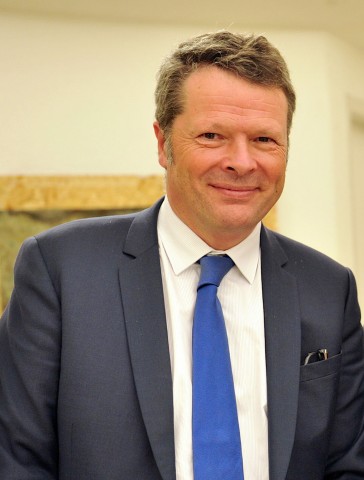
Meet François Werner, Vice-President of the Delegation for the coordination of European policies, Higher education and Research of the Grand Est region, partner of Science & You 2021 which will take place in Metz.
The Grand Est Region is overseeing implementation of the 2020-2030 Regional Strategy for Higher Education, Research and Innovation. In your opinion, what are the main current issues involved in the dialogue between science and society?
François Werner: “Scientific progress and democratic debate are cornerstones of our society. They’re both based on dialogue, contradiction, and argument. In the era of fake news and conspiracy theories, maintaining dialogue between science and society is of key importance to our model of society. It’s essential that such dialogue isn’t restricted to large urban centres but permeates the whole territory, involving all the Grand Est Region’s inhabitants.
The second issue is the need to inform all citizens on the technological and societal transformations underway. The acceleration of current transformations may be seen as dangerous by inhabitants and result in a refusal of change. The whys and wherefores of these transformations also need to be explained so that the population can prepare itself for them; assimilate every aspect of them, and understand the opportunities and risks involved.
Finally, and in view of the importance of these two issues, science and society dialogue must be guided by scientific mediation professionals. With the GESTE label, the Region has made the notion of professionalism central to its STIC policy. The importance of this issue was confirmed in the context of the Regional Strategy for Higher Education, Research and Innovation (SRESRI) adopted in July 2020.
Hence, for a Regional Council like ours, investing in science and society debates is a way of preparing for the future and upholding democracy.”
How are such international events as Science & You advantageous to the Grand Est Region?
François Werner: “Science & You is a major scientific and technical cultural event. The Grand Est takes pride in it as such events are few and far between but invaluable.
Its international aspect showcases the Grand Est’s experience and expertise in the field of scientific mediation, along with the scientific and technical skills on which experts on scientific culture are nurtured. As with all international colloquia, the Science & You event spreads the Region’s reputation by attracting a great many world experts in their fields.
Apart from the science and culture forum’s debates and presentations and the “Hubert Curien Days” colloquium, Science & You remains faithful to its connection with the public at large. As was the case with previous editions and even more so this year, the organisers and their partners will be providing a host of activities designed for the general public in the Grand Est. Lectures, exhibitions, attractions, science theatre, and all modes of mediation will be deployed to enable the public to assimilate the notions and issues involved in artificial intelligence, this edition’s common thread.
Hence, by combining international standing with local encounters between science and the Grand Est’s citizens, the Science & You event provides a renewed image of science and society relations. It promotes the sharing of scientific and technical knowledge between experts and the Grand Est’s inhabitants.”
The theme of artificial intelligence will be at the heart of the 2021 edition of Science & You. It’s also one of the Grand Est’s strategic focuses through the Regional AI Plan: can you tell us something more about that?
François Werner: “I’ve committed the Grand Est Region to an Artificial Intelligence Plan that confirms its ambition to be a leading Region with regard to innovation, a key factor in competitiveness, job creation and attractiveness. It has 3 priority focuses: health, industry and the bioeconomy. It’s based on a vision of a future European AI Valley stretching from Dunkirk to Basel.
Since its adoption, the plan has found concrete expression in numerous actions targeting academic actors (support to creation of AI Chairs, support to AI theses, and a cooperation agreement with INRIA), companies (creation of a transformation pathway making use of AI, and support to innovative collaborative projects), startups (support pathway from emergence to acceleration), students and jobseekers (creation of 3 Microsoft Simplon AI schools and a 42 school), and even the Grand Est’s citizens (the “AI’s for me” awareness-raising programme).
It’s also expressed in emblematic projects directly connected with the health crisis, including PredictEST, which is a platform for monitoring and forecasting the Covi-19 pandemic’s evolution. The project is based on a health-data infrastructure which will eventually enable territorial monitoring of other diseases. The tool has been taken up by other French Regions. It demonstrates the territory’s agility and its ability to promote innovative AI projects.
Finally, crossborder cooperation is of central importance to the regional plan. It’s given concrete expression in a range of projects, agreements and events. The Clinnova project, for example, is set to be one of the most concrete expressions of such cooperation. It combines the power of data and AI at the service of innovative therapies, by creating a secure health-data space shared by the Grand Est, Luxembourg and Germany.
cooperation will also be embodied in the European Digital Innovation Hub Grand Est created in the context of a European call for projects. Nothing less than a universal one-stop shop enabling companies’ digital transformation thanks to artificial intelligence, cybersecurity and high-performance computing, the eDIH Grand Est means to be Europe’s most connected eDIH through close cooperation with its crossborder neighbours’ eDIHs.
The Grand Est is more than ever before mobilised to meet today’s technological challenges that will shape our economy and society in tomorrow’s world. We promote a vision of AI at the service of humankind and respectful of fundamental ethical principles (transparency, non-discrimination, explicability and responsibility).”
